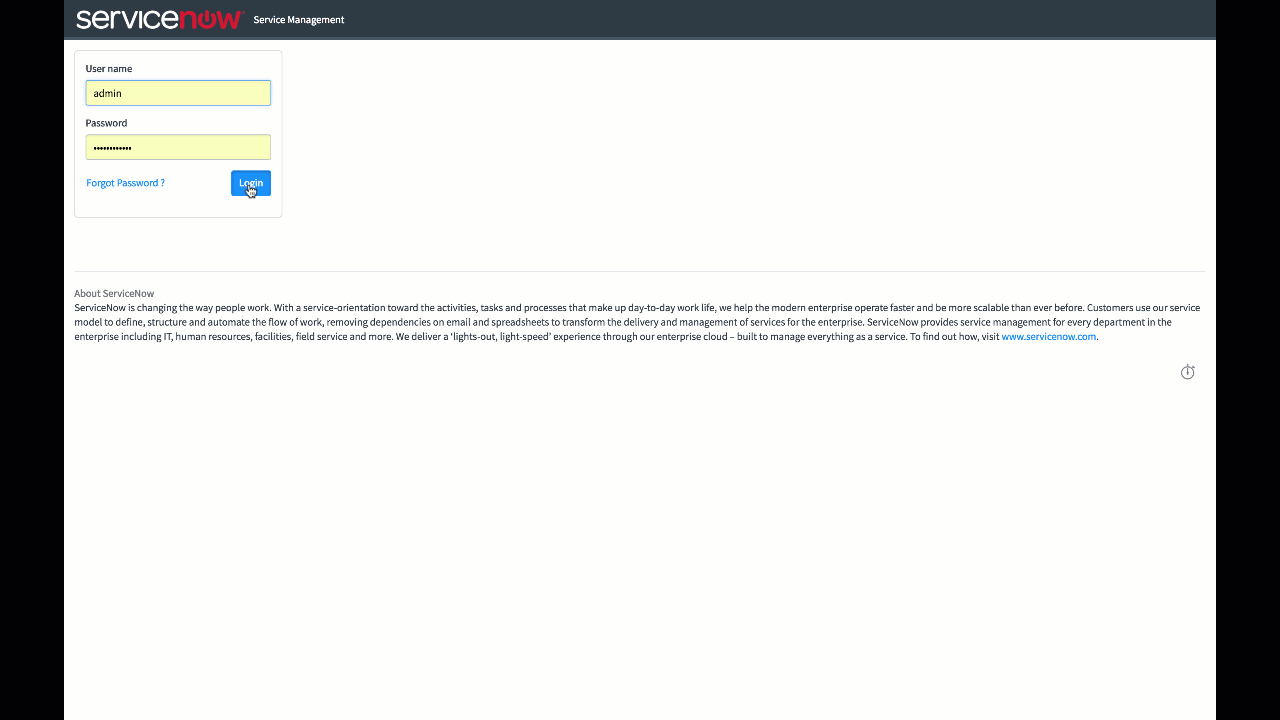Ansible + ServiceNow - Config Drift
Objective
Demonstrate automatic ticket creation for configuration drift. When the configuration for a Cisco CSR router doesn’t match desired config, a ServiceNow ticket with relevant information will be created.
- Ansible Playbook will check for desired configuration on rtr1
- The configuration is missing, which generates a Service Now ticket indicating rtr1 is out of compliance.
Table of Contents
- Step 1 - Connect to workbench
- Step 2 - Provide ServiceNow credentials
- Step 3 - Execute Ansible Playbook
- Step 4 - Show ServiceNow incidents
- Explanation
Step 1 - Connect to workbench
Connect to the workshop workbench:
[user@RHEL ~]$ ssh student1@student1.workshop.rhdemo.io
student1@student1.workshop.rhdemo.io's password:
Move into the demos/servicenow/1-config-drift directory.
[student1@ansible ~]$
[student1@ansible ~]$ cd ~/demos/servicenow/1-config-drift
Step 2 - Provide ServiceNow credentials
Define the login information (username, password and instance) as defined in the Common Setup. Fill this information out in login_info.yml with your text editor of choice.
[student1@ansible ~]$ nano login_info.yml
Step 3 - Execute Ansible Playbook
Run the config_drift.yml playbook:
[student1@ansible ~]$ ansible-playbook config_drift.yml

Step 4 - Show ServiceNow incidents
- Login to the Web URL
e.g.
https://dev66073.service-now.com/ - Click the Incidents link on the left menu
- The Incident just created will show up at the top of the list, assigned to the
System Administratorwhich is the default user for the ServerNow developer instance. - Scroll down to to read the
Short Desriptionand theAdditional Comments.

Explanation
The Ansible Playbook runs a task to configure a Cisco CSR router.
- name: configure interface settings
ios_config:
lines:
- description test
parents: interface GigabitEthernet1
check_mode: yes
register: changeFlag
This task uses the check_mode: yes which means the task will not make any changes on remote systems. This will force the task to report what changes they would have made rather than making them. To read more about check mode click here. This means the task will always report changed (for the purpose of the demo).
This task also is using the register keyword and storing the output to variable changeFlag. This means subsequent tasks can use see if this task reported changed or not.
Looking at the output from changeFlag there is a lot of useful information:
ok: [rtr1] => {
"changeFlag": {
"banners": {},
"changed": true,
"commands": [
"interface GigabitEthernet1",
"description test"
],
"failed": false,
"updates": [
"interface GigabitEthernet1",
"description test"
]
}
}
Here is a snippet of ServiceNow task:
- name: SERVICENOW IF CHANGED
block:
- name: CREATE AN INCIDENT
snow_record:
<<info removed for brevity>>
data:
short_description: "CONFIG OUT OF COMPLIANCE ON "
severity: 3
priority: 2
caller_id: "System Administrator"
comments: "The configuration:\n--------\n \n--------\n is missing on "
delegate_to: localhost
when: changeFlag.changed
The block uses the conditional when to only run if the previous task changed. This means a ServiceNow ticket is only generated if the task actually reports changed.
End of Demo

